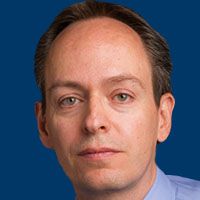Video
Dr. Ryan Sullivan on Treatment Options for Advanced Basal Cell Carcinoma
Author(s):
Ryan J. Sullivan, MD, instructor of Medicine, Harvard Medical School, assistant in medicine, MGH Cancer Center, Massachusetts General Hospital, discusses treatment options for patients with advanced basal cell carcinomas.
The majority of basal cell carcinomas have a mutation that predicts activity of a pathway. The smoothened gene, when mutated, leads to hyperactivation of the hedgehog pathway, says Sullivan.
There are several approved targeted therapies that block the hedgehog pathway.
However, for some patients, these therapies do not work forever and patients must be treated with another line of therapy.
Immunotherapy is being considered, however there is currently not a lot of data regarding the use of immunotherapy in basal cell carcinoma. It is known that one of the causes of basal cell carcinoma is through UV damage and mutational events in the skin—particularly in the basal layer of skin, says Sullivan.
Through those mutational events, there is likely a high mutational burden that would predict that there might be a response to anti—PD-1 therapies.









